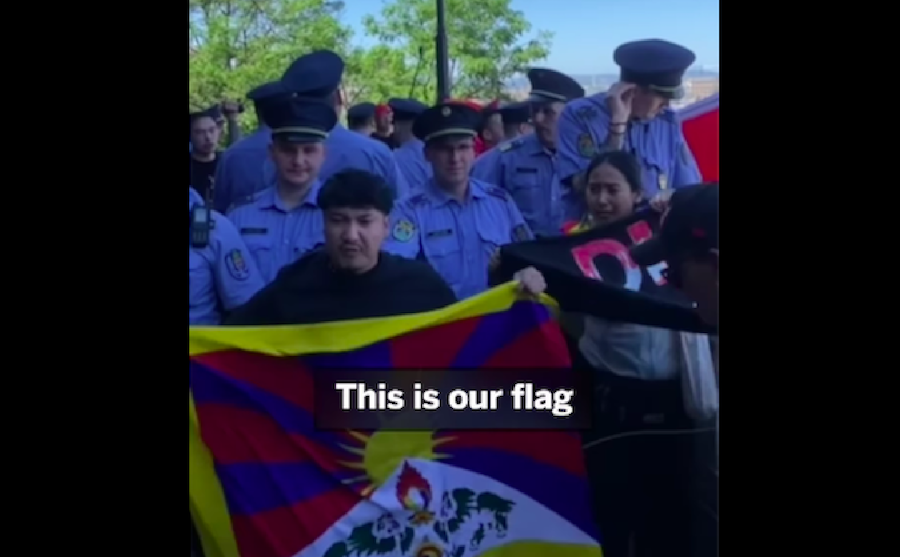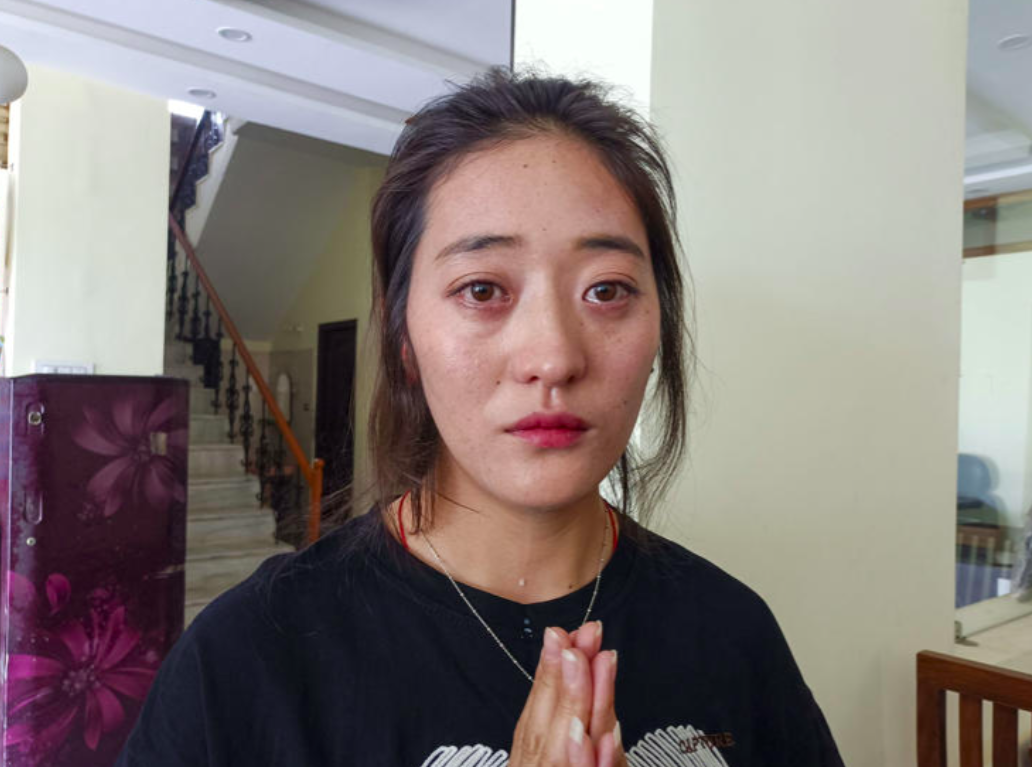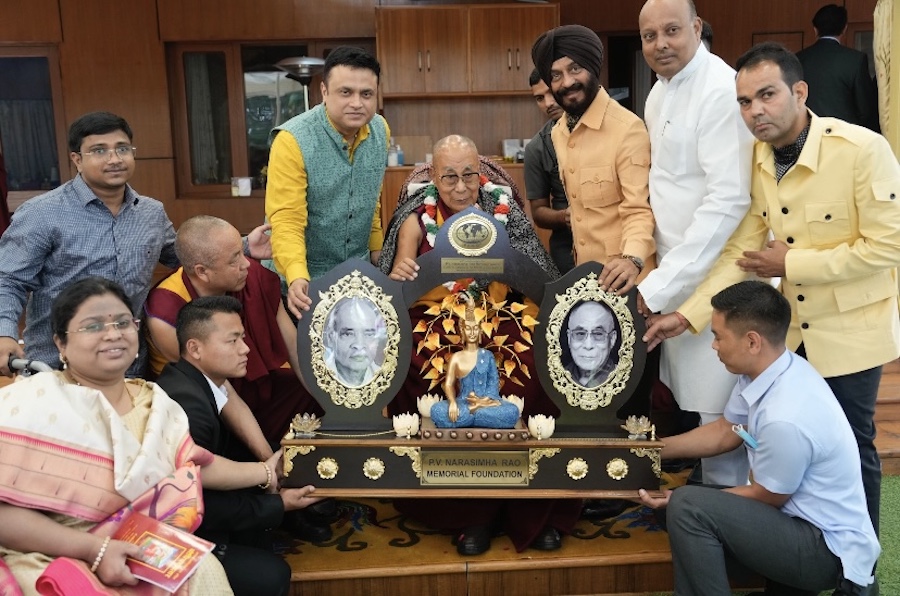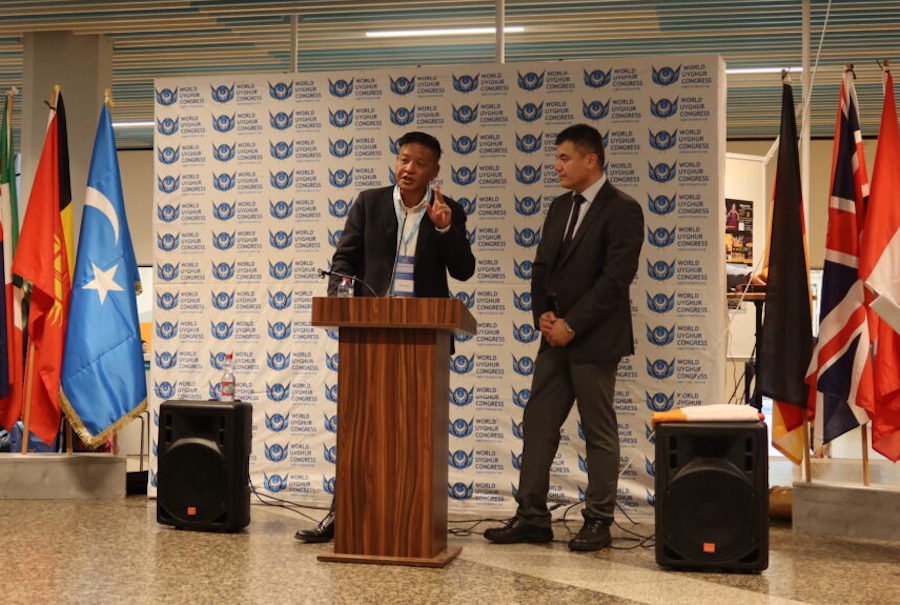Part One: Tibet-China Negotiations
During the past year, the Government of China has indicated a new willingness to engage in a dialogue with representatives of the Dalai Lama. Two delegations headed by the Dalai Lama’s special envoys have visited Beijing and met with officials there and in Lhasa, Tibet’s capital. In October WTN ‘s Thubten Samdup, sat down with Kalon Tripa Samdhong Rinpoche, Chairperson of the Tibetan Cabinet, to discuss the dialogue process and hopes for the start of real negotiations on the future of Tibet.
Notes:
Kashag – Cabinet
Kalon – Cabinet Minister
Kalon Tripa – Chairperson of the Cabinet
Assembly of Tibetan People’s Deputies – Parliament
SAMDUP: There has been some concern expressed among the Diaspora that management of the new dialogue process should be the responsibility of the elected Tibetan Parliament rather than the office of the Dalai Lama. What is your reaction to this concern?
KALON TRIPA: It is important to remember that His Holiness has always been 100 percent clear that Tibet-China negotiations are not about his personal status. The subject of negotiation is the future of people living inside Tibet. His Holiness has made it absolutely clear that nothing at all related to his personal status is to be negotiated. His Holiness is not negotiating for himself; he is negotiating for the people of Tibet.
If we were to insist that the Government of China negotiate with the Tibetan government-in-exile, then the matter would end right there. The Government of China would certainly state that it does not recognise the Tibetan government-in-exile. Just to avoid that outcome, we refer instead to “representatives of the Dalai Lama”. The Dalai Lama is the legitimate representative of the Tibetan people.
SAMDUP: The Dalai Lama has appointed 2 special envoys to establish the dialogue with Chinese authorities. During your mandate as Chief Minister, the envoys have led two delegations to Beijing. The perception among many Tibetans and non-Tibetan supporters is that these critical matters concerning Tibet’s future are being managed outside of Tibetan Government-in-exile. What is your view on the role and influence of the special envoys?
KALON TRIPA: The concept of His Holiness’ special envoys is not my making. I get it as a legacy dating back to the 1980s or 90s. When I took charge of the Kashag, the concept of envoy already existed and the appointments had already been made. My understanding of the rationale for a position of special envoy is that the People’s Republic of China (PRC) does not recognize the Tibetan Government-in-exile. Therefore it is not possible for the Tibetan Government-in-exile to interact with the PRC. Still, we need to achieve a dialogue with them and therefore the only way to do so is through His Holiness. Chinese authorities do not recognize His Holiness as the legitimate representative of Tibetan people, but they are ready to talk with His Holiness as the institution of the Dalai Lama. That understanding was established way back in 1979 and for the past 23 years that understanding has been maintained and the Tibetan people should understand it.
SAMDUP: How does the Tibetan Parliament, which is elected by the people, view its role in the negotiation process?
KALON TRIPA: The Tibetan Government-in-exile has 2 functions – the first is to manage foreign relations and policy with countries other than the PRC. The second is to achieve a dialogue with the PRC in the hopes of launching negotiations on the future of Tibet.
Regarding the dialogue with the PRC, it is under the direct leadership of His Holiness and everything is decided by him. Why? It is the result of the Tibetan people’s popular mandate which was given via a referendum which was later endorsed by the parliament-in-exile. Through the referendum, the people authorized His Holiness to make decisions with regards to relations with the PRC dependent on the current situation. The people have not authorized the Kashag to manage this process and they have not authorized the Department of Information and International Relations (DIIR) to do this job.
Nevertheless, His Holiness is kind enough to consult with the Kashag and therefore before the 12th Kashag session (1996-2001), the business of dialogue with Beijing was discussed among the individuals who advised His Holiness on this matter: the two envoys, the Kalon Tripa; the Kalon for Information & International Relations; the former Chairman of the Assembly of Tibetan People’s Deputies (at the time, Samdhong Rinpoche). We were requested by His Holiness to discuss options and offer suggestions to him. He makes the final decision which is then implemented through the two envoys. This is exactly in accordance with the mandate of the referendum with the endorsement of parliament.
As far as international relations with countries other than China are concerned, that is the co-responsibility of the Kashag and the DIIR. In this regard, the envoys are sometimes consulted but many times they are not consulted. They are not representatives of the Offices of Tibet which operate abroad. The DIIR consults with its various representatives in the Offices of Tibet as official procedure and they implement its directives. However, as far as the dialogue with China is concerned, its implementation is the exclusive responsibility of the two envoys under the directives of His Holiness.
SAMDUP: Even understanding this background, the fact remains that the 2 special envoys have tremendous influence. And therefore the perception among Tibet support groups (non-governmental groups), and the Tibetan people themselves is that there may be some cause for worry in terms of the democratic process. Now that we have succeeded in establishing a democratic system of governance in exile with a Kalon Tripa holding a strong mandate, many in the Diaspora expected to see your office playing a more prominent role in the negotiation process. For example, during the first or second delegation visit last year, the press statement came from the Private Office of the Dalai Lama, not from the Tibetan government or parliament.
KALON TRIPA: I think that this is unnecessary worry. As I have mentioned, the parliament has authorized His Holiness to make all decisions with regards to the dialogue and negotiation process. There is no authorization for the Kashag to do this job. When the decision was taken, neither the Kashag nor the people expressed any reservations about it. It was the only way to achieve the dialogue because if the Tibetan Government-in-exile were involved in any way, then the PRC would not agree to talk.
Your readers might remember that His Holiness once sent a delegation to approach the Chinese Embassy in Delhi. Among the delegation members was one of the secretaries of the DIIR and the Chinese Embassy representative said very clearly “sorry he cannot come because he is an employee of the so-called Tibetan Government-in-exile”. That was their attitude. Under these circumstances, the only way for us is to approach the Chinese through His Holiness and that approach has to be transparent in the international scenario, particularly to the Chinese leadership. For that reason after the first envoys’ mission, the press release was issued by the private office and it was notable that the PRC did not contradict that statement. The Chinese statement was different but it did not say the statement from His Holiness’ Private Office was untrue. And I would like to mention here, that if His Holiness envoys should visit China again, the press release would again come from the Private Office, not the Kashag.
The envoys may be very influential but you should know that your Kalon Tripa cannot be influenced by any influential person. There are many influential persons in the Tibetan community, but my weaknesses or demerit is that I am not able to be influenced by anyone and therefore I am an unpopular person. Any decision so far about the negotiation strategy has been the result of consultation and discussion between the team of advisors and His Holiness. We have never taken any decision without His Holiness and during the course of our discussions I don’t believe that I have been unduly influenced by any influential person. I am happy that His Holiness’ envoys are influential persons – that’s good, they need to be influential persons who can impress the Chinese leadership and I wish and I hope and I believe they will be successful in their efforts.
SAMDUP: I want to go back to your earlier point that the Tibetan people have requested that His Holiness deal directly with Tibet-China negotiations. Even with this mandate, however, His Holiness has always come back to the Kashag for consultation. If the public felt strongly and if the parliament felt strongly that a different approach should be pursued – it would be possible to reverse that original mandate.
KALON TRIPA: Even if the Tibetan people did feel strongly about this, and I don’t believe that they do, the parliament could not independently reverse it. In this matter the parliament is not independent because the original decision was guided by the opinion of the people as expressed in a referendum. Sixty-six percent of the Tibetan people said that His Holiness should take care of the relationship with China. That mandate of the people was subsequently endorsed by the parliament unanimously.
Recently in the last session I said that as far as the negotiation with the PRC is concerned there are only 2 ways to change our Middle Path Policy. The first is by His Holiness himself and the second would be through another referendum. Parliament is also not competent to change it because it was not a parliamentary decision. Parliament only endorsed the opinion of the people expressed during the process of referendum. If we want to change it then either we have to go to the people for another referendum, or we have to go to His Holiness to request him to change the policy.
SAMDUP: That means, in theory, that if there were enough people in the Tibetan Diaspora who believe strongly that a different process should be put into place, it is conceivable that a change could be made.
KALON TRIPA: Yes, everything is possible in a democratic society. But there are procedures. If people gossip among themselves, that will not change it. His Holiness is not required to initiate a new referendum because His Holiness has the mandate to decide from time to time according to the situation. That is a very clear mandate. If parliament wants to make a change, then parliament should initiate another referendum and parliament has every authority and power to do so. If the people want to conduct a campaign addressed to their parliamentary representatives to make that change, then they have the right to do so.
SAMDUP: We often seem to use the words “dialogue” and “negotiation” inter-changeably. In your mind, what is the difference between them?
KALON TRIPA: There is a big difference – we have achieved a dialogue but we have not achieved a negotiation. Dialogue means 2 parties talking face to face with each other. Negotiation means there is an established process to resolve specific matters between the 2 parties. For example, His Holiness has put forward an agenda in the Strasbourg Proposal – he has a proposal. Now, if China comes to the negotiation table, its representatives will say, “this is not acceptable” or “this is acceptable”. Then our people will have to respond saying “no, you have to accept this because of this, this or this.” That is not mere discussion, it is negotiation. We have not yet entered negotiations. Therefore, in all the records and documents, we do not say we are in negotiations with the PRC. We have entered a dialogue and now this dialogue may result in negotiations.
SAMDUP: In what ways would the negotiation process differ from the current dialogue initiative?
KALON TRIPA: His Holiness is very clear about negotiations – once the negotiations start then the responsibilities of the special envoys will end and a fresh negotiation team will be constituted. That negotiation team should consist of people from inside Tibet and from the Diaspora, along with scholars, eminent persons, public figures, historians, politicians. The responsibility of His Holiness’ envoys is to prepare the ground for negotiations and to bring China to the negotiation table. That is very clear in their mind, in His Holiness’ mind and in my mind.
End of part one: Comments should be sent by email to wtn-editors@tibet.ca.
For more information about the Tibetan government-in-exile, visit www.tibet.net
For more information about Tibet-China negotiations, visit www.tibet.ca/tibetchinanegotiation









